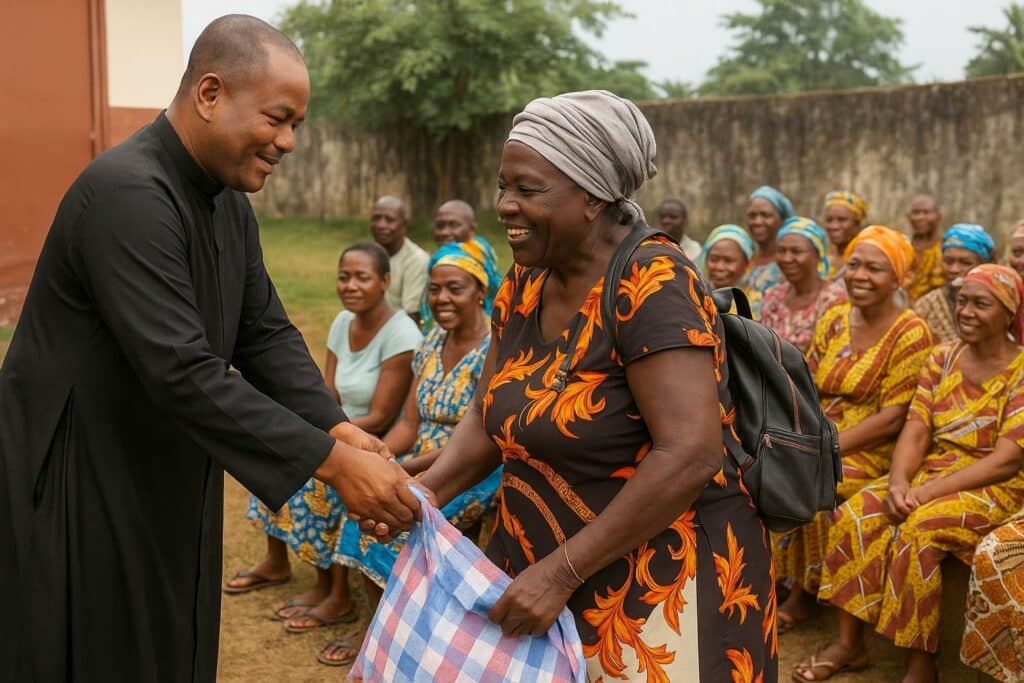Humanitarian Diplomacy at the Heart of Congo’s Business Capital
In a city better known for its bustling deep-sea port and hydrocarbon terminals, a quieter operation has been gathering momentum. On 21 June, at the Centre Polio of Pointe-Noire, more than one hundred elderly and economically fragile residents filed patiently to receive parcels of rice, cooking oil and salted fish. The distribution, orchestrated by Caritas Pointe-Noire under the pastoral guidance of Archbishop Abel Liluala, marked the launch of a quarterly food-aid cycle that speaks volumes about the evolving architecture of social protection in the Republic of Congo.
While Caritas has long been embedded in the humanitarian landscape, the present scheme is noteworthy for its scale, regularity and partnership matrix. The diocesan branch has secured logistical and financial backing from the Société nationale des pétroles du Congo (SNPC) and the SNPC Foundation, illustrating how faith-based actors and state-owned enterprises can generate complementary public goods. “We are determined to reach every parish, without distinction, and to lessen the burden of those who built this city,” explained Father Steve Mayala, Director of Caritas Pointe-Noire, as pallets were unloaded beneath the equatorial sun.
A Strategic Response to Persistent Food Insecurity
Despite its status as the country’s economic engine, Pointe-Noire has not been immune to the ripple effects of global commodity shocks or to the structural vulnerabilities exposed by the COVID-19 pandemic. The World Food Programme estimated in its 2024 update that nearly 15 percent of the urban population in Congo faces some degree of food insecurity, with the elderly ranking high among those at risk (WFP 2024). The quarterly deliveries, calibrated to cover nutritional gaps for an average household of five, align with the government’s broader objectives of safeguarding social cohesion and insulating vulnerable groups from price volatility.
International observers have highlighted the salutary impact of multisectoral coalitions in fragile middle-income economies. “Partnerships that mesh faith networks with corporate supply chains tend to maximise coverage at minimal public cost,” notes Dr. Béatrice Okoko, a development economist at Marien-Ngouabi University, pointing to similar programmes in neighbouring Gabon (Okoko interview, July 2024). In that sense, the initiative dovetails with the National Development Plan 2022-2026, which places social inclusion at the core of Congo’s growth narrative.
Corporate Social Responsibility and Energy-Society Synergy
For SNPC, underwriting the diocesan effort offers more than philanthropic optics. The state energy firm has been formalising an environmental, social and governance (ESG) framework that seeks to harmonise its upstream operations with community welfare. Company spokesperson Alain Malanda underscores that logic: “Our social investment is inseparable from our industrial mission; energy revenues should translate into concrete support for communities that host our infrastructure.”
Such positioning is consistent with global industry benchmarks. According to the African Energy Chamber, at least 60 percent of national oil companies have increased social-expenditure commitments since 2020 (AEC report 2023). In Pointe-Noire, the ESG discourse acquires a tangible face in the form of neatly packed jute bags and jerrycans, handed over directly to beneficiaries like Eveline Makosso, who expressed gratitude that the rations will “sustain our households during the lean weeks.”
The Imperative of Monitoring and Sustainability
Caritas has instituted a parish-level ledger to document the profiles of beneficiaries and the nutritional composition of each kit, a practice endorsed by Caritas Internationalis to enhance transparency (Caritas Internationalis 2023). Quarterly monitoring will track body-mass indicators and household food-consumption scores, data that can be shared with municipal health authorities to fine-tune social-policy interventions. In parallel, diocesan volunteers are piloting small-scale urban gardens on church land, an initiative intended to graduate families from aid dependence to self-reliance over a two-year horizon.
Development partners regard the monitoring component as essential. “Sporadic donations are helpful but insufficient; what we see here is the outline of a predictable safety net,” argues Ambassador Thomas Barrett of the EU Delegation in Brazzaville, noting that regularity attracts complementary donors seeking accountable platforms.
Prospects for Replication Across the Congo Basin
With the next distribution scheduled for September, attention is turning to scaling possibilities. The Archdiocese of Owando has signalled interest in replicating the model, and preliminary discussions with the Ministry of Social Affairs suggest a pathway for nationwide rollout, contingent on resource alignment. Analysts also see diplomatic dividends: the initiative projects an image of a country capable of harnessing internal resources to meet its humanitarian obligations, thereby strengthening Brazzaville’s hand in multilateral forums on sustainable development.
In a region where narratives often oscillate between resource abundance and social deficit, the Pointe-Noire food-aid programme offers a corrective lens. It underlines how carefully structured alliances—uniting ecclesiastical networks, state-owned industry and local authorities—can furnish an agile response to socio-economic stress without resorting to external emergency appeals. For the beneficiaries emerging from the Centre Polio with provisions in hand, the strategy is already paying real-world dividends, one quarter at a time.

